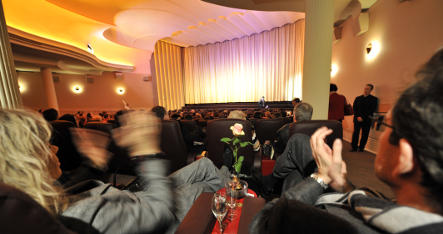Berlin’s most decadent Kino
The drinks; the legroom; the gourmet food and the wide, wide leather seats: the Astor Film Lounge may be a cinema, but it offers so many extravagant comforts you’d be forgiven for mistaking it for business class on a transatlantic flight. Or the bar of a fourstar hotel. Housed in one of Berlin’s classic cinemas – the 57-year-old Filmpalast, a protected heritage site, was ‘made over’ for its opening on December 22 – the Astor combines the best of old and new. It provides champagne, a coat check and valet parking alongside state-of-the-art projection equipment and a rather unadventurous selection of recent Hollywood films. The menu ranges from snacks to full meals and features such classy culinary delights as lamb with vegetable couscous, mushroom soup with Gorgonzola and chocolate tart with carmelised orange, all of which are brought directly to your set. The Astor’s prices match its atmosphere of luxury (tickets cost €10 to €15 for matinees and €12.50 to €17 after 16:00) but, well, everyone needs a treat sometimes!
Astor Film Lounge, Kurfürstendamm 225, Charlottenburg, U-Bhf Uhlandstraße, Tel 8838551, www.astorfilmlounge.com
Luxury nomads
Remember that transient, ultra-luxury, über-cutting edge menswear boutique we mentioned last month? The one that plays a cheeky game of hide and seek by changing its address twice a year? Well, this time Darklands has swapped a seedily stylish ex-bordello on Gormannstraße for sleek minimalism on Steinstr. It’s just a few minutes away, but an entirely different experience: welcome, my friends, to Darklands 2.0 – new, improved and, if possible, even more exclusive. Campbell McDougall, who opened his first store Komakino in Vancouver five years ago, relocated to Berlin last summer – and brought with him a series of high-end designer brands like Carol Christian Poell, Julius, Augusta, Lumen et Umbra, MA+ and Goti. Darklands specialises in unique, handcrafted pieces made with innovative techniques, ideas and materials. An item by Carol Christian Poell, McDougall explains, is a piece of conceptual art. And it is priced accordingly: Poell’s clothing sells for €1,200 and up. Perhaps we should just look at the shop as if it were a gallery…
Darklands, Steinstr. 5, Mitte, U-Bhf Weinmeisterstr., Fri-Sun 13:00-19:00,
www.darklandsberlin.com
Comic nerds of the world unite
Come out of that closet where you hide your dusty old Donald Ducks and discover a world beyond Disney, manga and Superman: a universe of GDR comics, tough girl tales, philosophical graphic novels and legitimate dirty mags. At the “Bei Renate” Comicbibliothek, an outgrowth of Berlin’s vibrant post-1989 squat scene, you’ll encounter an assortment of no fewer than 15,000 comic books and related reference works. The bottom line at Bei Renate is that they are a medium in need of protection – no one cares whether comics are visual art or literature, only for children or just someone’s sick habit. A whole wall of the library is devoted to original titles, most of which are in English. The rest are in German, but the combination of text and images makes them an ideal learning aid for those Anglos who finally want to pick up the dang language. Brilliant full length stories by authors like Mawil and Reinhard Kleist will make even the freshest faced expat feel like a true Berliner, while Fil’s local classic Didi & Stulle proves once and for all that the old myth about Germans not having a sense of humour is, well … Nothing but an old myth. Membership costs €2.50, plus another €2.50 for every month you actually borrow books. Visit the website to find out about workshops for kids and adults. Every first Monday of the month is the Stammtisch: have a beer, hang out with the other nerds, trade and talk comics.
“Bei Renate” Comicbibliothek, Tucholskystr. 32, Mitte, S-Bhf Oranienburger Str., Tel 9700 5815/16, Mon-Wed 14-20:00, Fri 14-19:00, Sat 13-18:00, www.renatecomics.de
Click here for more from Berlin’s leading monthly magazine in English.



 Please whitelist us to continue reading.
Please whitelist us to continue reading.